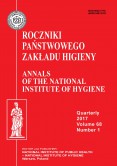Rocz Panstw Zakl Hig 2015, 66(4): 337-344
Lifestyle of students from different universities in Wroclaw, Poland.
[Lifestyle of students from different universities in Wroclaw, Poland.]
ABSTRACT
Background. Changes in the economic and political system that took place in Poland in recent decades had a significant impact on lifestyles of different social groups, especially in youngsters as vulnerable and open to all novelty and changes.
Objective. The aim of this study was to evaluate the healthy or non-healthy behaviours including physical activity, diet, time devoted for sleeping, leisure, stress and the use of drugs by students of four universities in Wroclaw.
Material and Methods. The study involved 604 students (305 women and 299 men) from four universities in Wroclaw: University of Wroclaw - 25.0%, Wroclaw University of Technology - 24.5%, University School of Physical Education (AWF) - 25.2% and Wroclaw Medical University - 25.3%. A questionnaire developed for this study was used. The questions were both open and closed, one or multiple answers could be matched. The questions related to: physical activity, nutrition, time devoted for sleeping, leisure, stress and stimulants.
Results. On the basis of the results it was found that students mostly reported an average level of physical activity. The highest level of physical activity was presented by students of the University School of Physical Education and the lowest by students of the University of Wroclaw. Just one in ten students consumed meals on a regular basis, including one in five studying in the AWF. Almost half of the respondents (48.7%) spent 5-7 hours sleeping. Every tenth student slept less than five hours. Most respondents preferred passive forms of recreation, only one in three practiced sports in their spare time (usually students of the AWF). Every fourth student declared smoking, and more than 90% consumed alcohol.
Conclusions. Lifestyle of majority of the students surveyed did not follow the recommendations of preventive care. The need for more efficient education of students is obvious, which will lead to the future positive changes in their lifestyle, reducing the risk of lifestyle diseases.
STRESZCZENIE
Wprowadzenie. Zmiany ekonomiczne i ustrojowe, jakie miały miejsce w Polsce w ostatnich dziesięcioleciach w sposób znaczący wpłynęły na styl życia różnych grup społecznych. Grupą niewątpliwie podatną i otwartą na wszelkie nowości i zmiany są młodzi ludzie
Cel badań. Celem pracy była ocena zachowań pro- i antyzdrowotnych – w tym: aktywności fizycznej, sposobu odżywia¬nia, długości snu, spędzania czasu wolnego, stresu i stosowania używek przez studentów czterech uczelni wrocławskich.
Materiał i metody. W badaniach wzięło udział 604 studentów (305 kobiet i 299 mężczyzn) z czterech wrocławskich uczelni wyższych: Uniwersytetu Wrocławskiego -25,0%, Politechniki Wrocławskiej - 24,5%, Akademii Wychowania Fizycznego (AWF) - 25,2% i Uniwersytetu Medycznego - 25,3%. W badaniu wykorzystano autorski kwestionariusz ankiety.
Wyniki. Stwierdzono, że studenci w większości odznaczali się średnim poziomem aktywności fizycznej, najwyższy poziom cechował studentów Akademii Wychowania Fizycznego, najniższy - studentów Uniwersytetu Wrocławskiego. Tylko, co dziewiąty student odżywiał się regularnie, w tym, co piąty z AWF. 48,7% badanych przeznaczała na sen 5 -7 godzin. Co dziesiąty student sypiał krócej niż 5 godzin. Większość badanych preferowała bierne formy odpoczynku, a co trzecia osoba uprawiała sport w czasie wolnym (najczęściej studenci AWF). Co czwarty student deklarował palenie papierosów, a ponad 90% spożywanie alkoholu.
Wnioski. Styl życia większości badanych studentów odbiegał od zaleceń profilaktyki zdrowotnej. Widoczna jest potrzeba edukacji młodych ludzi, która doprowadzi w przyszłości do korzystnych zmian w ich stylu życia ograniczając ryzyko chorób cywilizacyjnych.
Downloads: 3013


